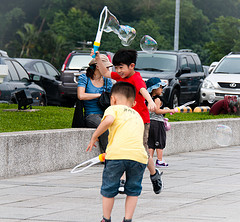
flic.kr/p/bx7faZ
Parenting is serious work. As a parent, you’re entirely responsible for keeping your children well fed, comfortable and clean. You need to take care of them as infants, chase them through the toddler years, and then be sure they’re receiving the best possible education when they reach school age. Parents need to encourage children to take part in activities, and then pull in the reins when they’re doing too much.
So, how much is too much? Should your 9-year old really be taking part in football practice five days a week, or is three days fine? It’s common for parents to be a little confused when determining how much is too much with reference to after school activities.
Parents feel there’s no problem with letting their kids take part as much as they like because, unlike studies, these activities are fun. But too much activity can actually make a child ill.
Limiting after school activities can be a hard task. The following guide will assist you to decide if you child is doing too much:
Kindergarten:
At the age of five or six, children are just starting to learn to interact and respect discipline. At this point, after-school programs should be carefree and simple. At the beginning, one or two classes per week are good. Once the child settles in, you can begin looking at other activities such as music programs or sports.
Grade 1:
First-grade students are just getting used to full days of classroom time, so limiting after school activities is critical. Playground visits, play dates, and one or two activities per week is recommended. After the hardships of a full day at school, he or she will need a healthy outlet for pent up energy. Noncompetitive sports and physical activities are the best choices for this age. Stay away from competitive sports activities, as kids this age are too young to have to deal with winning and losing.
Grade 2:
At this stage of life, your child is old enough to voice thoughtful opinions on what activities he or she wants and likes. There are programs involving computers, swimming, skating, sports–whatever strikes a chord of interest. Many children start music lessons at this age. Encourage your child to share his or her interests, and then select a program. Bear in mind though, kids need to have time to be kids and just hang out. At this age, limiting after school activities is still necessary.
Grade 3:
Socialization begins to take center stage by the third grade. Team sports are a great choice for kids of this age, as are opportunities to draw, paint, and develop motor skills. Let your child explore areas of interests, but leave time for family and fun activities.
Grade 4:
By the age of 9 or 10, kids are absolutely voicing opinions on what they like and don’t like. This is a crucial age for personal development, so children need to be involved in activities that will push their self-confidence. Peer pressures are also starting to build, and group activities are important steps to learn stress management techniques. However, beware of the homework demons that require your child to spend more time studying. You’ll find that limiting after school activities to balance homework with other interests is crucial for your child’s success.
Grade 5:
Fifth graders are bursting with energy and like to do just about everything. At this age, it’s typical for kids to want to set their studies aside to make room for fun activities. Your direct supervision is required. This is a great age to get kids interested in community service activities that your whole family can take part in.
Middle school:
Your adolescent child is going through the most difficult phase of his or her young life. Pre-teens feel the pressures of school, athletic achievements, home responsibilities, and most importantly (to them, at least) peers. At this age, academic accomplishment can hit a slippery downward slope. Steer your kid away from television, and encourage him or her to enhance their academic performance by taking part in reading groups, scouting programs, chess clubs, or even taking a second language course. While your child is going through huge emotional changes, he or she is growing physically as well, and requires plenty of rest. As a rule of thumb, additional activities should be limited to 16-20 hours a week. Give your kids a little space, but watch carefully for indications of burnout.
The programs you choose for your child, and the length of time you’re willing to let him or her take part, should be decided in part by your child’s temperament. As a parent, you should closely observe your child’s activities and interests, and include his or her feedback in your decision. Limiting after school activities is a vital part of being a responsible parent.
Tagged with: child care • parenting
Filed under: Solve Problems